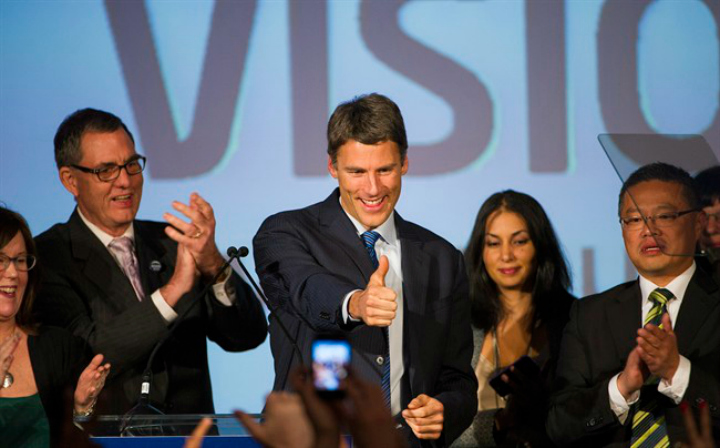Mayor Gregor Robertson said Vision Vancouver has heard people’s concerns about housing “loud and clear” after its candidate came in fifth in the Oct. 14 byelection.

Diego Cardona drew 5,411 votes, putting him ahead of only three independent candidates and Mary Jean “Watermelon” Dunsdon.
The party also managed to elect three out of its five school trustee candidates.
Coverage of Vision Vancouver on Globalnews.ca:
In the wake of Cardona’s defeat, Robertson issued a statement saying, “Vancouverites are frustrated — particularly around housing affordability — and they expect more from us.
“We’re working hard to deliver solutions, but tonight’s results show us there’s much more work to do.
“I heard that message loud and clear, and our party heard that message loud and clear.”
For Andy Yan, the director of the SFU City Program and an urban planner who has long focused on affordability issues, the byelection results reflected voters’ feelings that the City of Vancouver wasn’t hearing them on housing.
“I think many Vancouverites feel like city hall isn’t listening,” he told BC1 on Sunday.
“But then I think after elections like this, they can certainly be heard.”
READ MORE: Vancouver’s housing crisis key issue for newly-elected city councillor
Housing data shows that housing affordability steadily deteriorated over the years that Vision has spent in power.
Servicing a mortgage on a standard condominium in Vancouver took up 39.6 per cent of people’s incomes in the fourth quarter of 2009, according to a housing affordability report by RBC.
Back then, the average market price for such a unit was $362,700.
By the second quarter of 2017, servicing the mortgage on a condo had climbed to 46.2 per cent of people’s income, more than anywhere else in Canada — though it fluctuated over the years.

Get breaking National news
Meanwhile, the average market price for a condo had climbed to $562,400.

If you ask Justin Fung, the spokesman for activist group Housing Action for Local Taxpayers (HALT), there are numerous reasons why Vancouverites feel this way.
Among other things, Fung was upset with Robertson’s response to a 2015 study by Yan, which showed that expensive homes on Vancouver’s west side were being bought up by people who listed their occupations as students or homemakers.
Yan searched titles to homes by looking for non-anglicized Chinese names. These factors were used as determinants of foreign investment, which has long been cited as an influence on skyrocketing home prices in the city.
In a Facebook post at the time, Robertson said, “What we don’t need… is the blaming of any one group of people — or any one kind of last name — for the challenge of housing affordability.
“This is a public policy issue, not a race issue,” he added.
“Nine years ago, they were seen as a fresh set of ideas,” Fung said of Vision Vancouver.
“It’s hard to take them seriously when they’ve made a lot of moves that have undermined housing affordability.”
Fung also said there’s a perception that Vision Vancouver is closely tied to developers.
In the last civic election, the party raked in hundreds of thousands of dollars in donations from developers including Aqulini Development ($60,000) and Concord Pacific ($50,000), as well as real estate marketing company Rennie Marketing Systems ($26,000).
Earlier this year, Robertson denied to CKNW’s Jon McComb Show that he was too closely tied to the development community, when he was asked whether donations had swayed any decisions against city needs.
That was after council approved a 57-storey tower for developer Westbank, over the objections of residents.
“Absolutely not. There’s no connection at all there, there’s certainly developers that donate and write significant cheques given it’s the wild west out here,” he said.
“We’ve asked for nine years that I’ve been in office on an annual basis for the B.C. government to put rules in place to cap donations, to prevent corporate and union donations.”
READ MORE: Mayor Gregor Robertson denies Vision Vancouver too closely tied to developers
Earlier this month, Robertson brought forth a policy idea that would see pre-sales marketed to local residents for 30 days, before they’re marketed to Metro Vancouver residents for the next 60 days.
Buyers would also have to agree not to flip them, and to live in the homes themselves.
READ MORE: Vancouver looking into new policy to market pre-sale homes to locals first
For Fung, an initiative like that comes too little, too late.
“I think it’s a little bit of window dressing,” he said.
“We have to do a little bit more about what we do about that money coming in, and I think a lot of that is pressure on the provincial and federal governments as well.”
Fung thinks Vision faces a struggle if it wants to hold on to power in next year’s civic election.
“I just think that you have nine years of track record that you have to work against,” he said.
Yan thinks it’s possible that Vision Vancouver can come back. But the clock is ticking, and the left-leaning vote was heavily split in the byelection, favouring Jean Swanson over anyone else.
“I think there is a possibility,” he said.
“But Vision doesn’t have too much time to makes those kinds of gestures toward those that previously supported them.”
- With files from Amy Judd and Matt Lee









Comments
Want to discuss? Please read our Commenting Policy first.